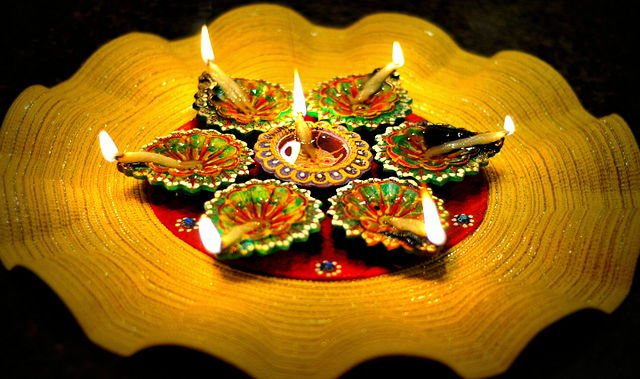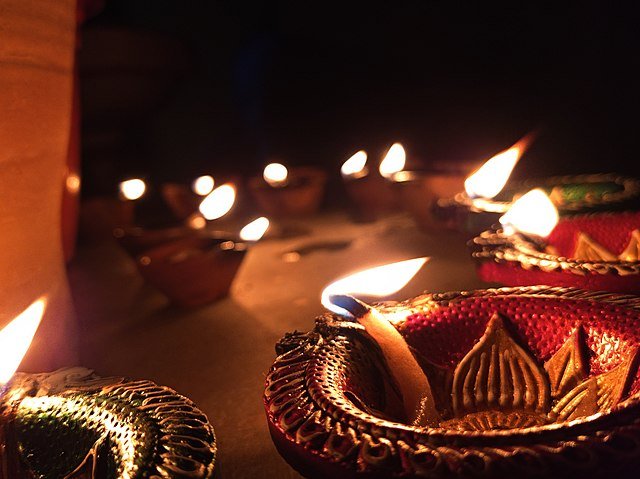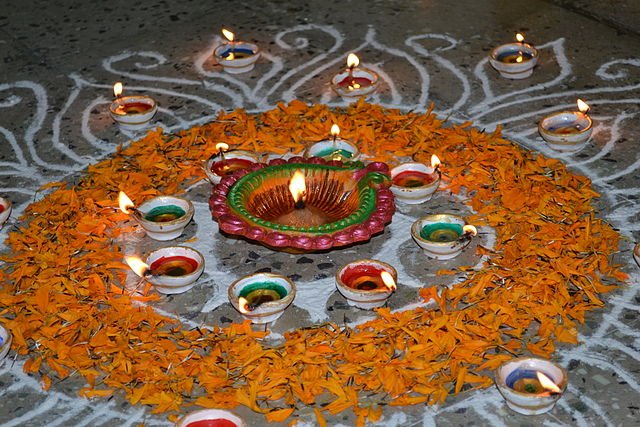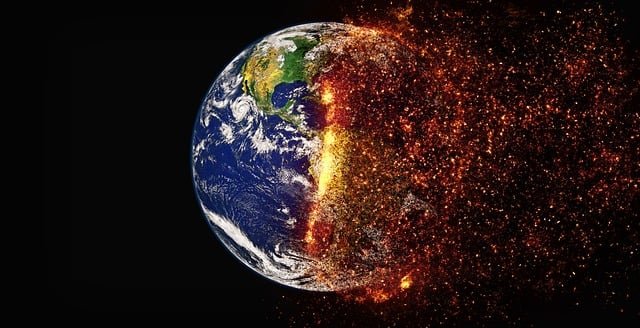Table of Contents
Dear Students, please find below 6 sample Essay on Diwali with a bonus essay at the end. Learn and grade more for your success.
Are you curious about one of the most popular festivals celebrated by Hindus worldwide, the Diwali celebrations? Diwali parties are a common way to celebrate this festival. Let’s dive into an introduction to Diwali, the friendly Diwali celebrated by Hindus globally. Diwali, also known as Deepavali, is one of the main festivals in India that holds great cultural and religious significance. It is one of the most popular festivals celebrated with firecrackers. Diwali has a special connection to Ayodhya.
Diwali holds great spiritual significance as it symbolizes the fight between light and darkness and good triumphing over evil. It brings great joy to people, and in conclusion, Diwali is a celebration of victory. During Diwali, homes in Ayodhya are adorned with lit Diyas (earthen oil lamps), colourful lights, firecrackers, and candles, creating a mesmerizing spectacle. Diwali is one of the main festivals celebrated in Ayodhya. This festival of Diwali brings people together as they celebrate with festivals, Diwali celebrations, and Diwali parties. They exchange gifts and indulge in delectable sweets while also enjoying the excitement of firecrackers.
Diwali is not just about lighting lamps; it is a time for reflection, gratitude, celebration, and participating in rituals like lighting firecrackers to honour the goddess on this special day. The main rituals of Diwali celebrations include cleaning houses to welcome prosperity, performing prayers during the Diwali festival to seek blessings from deities, and bursting firecrackers to ward off evil spirits and pollution. As the darkness fades away under the warm glow of Diyas, Diwali celebrations fill the air with joy and families gather to create lasting memories through firecrackers and rituals on this special day.
So, if you’re ready to dive into the magic of Diwali and explore its rich traditions and customs, buckle up for an unforgettable journey through this enchanting festival! From lighting firecrackers to performing rituals in honour of the goddess, Diwali is celebrated with joy and reverence throughout the day. From lighting firecrackers to performing rituals in honour of the goddess, Diwali is celebrated with joy and reverence throughout the day.

Significance & Importance of Diwali: Unveiling its Cultural Significance (Sample Essay On Diwali 1)
Diwali, also known as the Festival of Lights, is a day of immense spiritual significance and cultural importance in India. It is a time for rituals and celebrations to honour the goddess. Firecrackers are commonly used during this festive day. This vibrant festival celebrates various mythological events, most notably the return of Lord Rama from his 14-year exile during Diwali celebrations. The rituals and firecrackers are a significant part of this festival, along with the worship of the goddess. The festival is a celebration of righteousness triumphing over evil, reminding people of the power of spiritual enlightenment. It is a day filled with rituals and honours the goddess.
One of the key aspects that make Diwali truly significant is its ability to bring people together on this auspicious day. Diwali is a festival that is celebrated with crackers and various rituals to honour the goddess. During this festive season, people come together to celebrate the victory of good over evil through rituals and by lighting crackers throughout the day. Regardless of their background or beliefs, communities unite in this joyous celebration. It fosters a sense of harmony among people and strengthens bonds among individuals, creating an atmosphere filled with love and joy on this goddess day. Rituals play a vital role in bringing people together and enhancing the overall experience.
Moreover, Diwali encourages people to reflect upon their actions and seek personal growth every day. As people light Diyas (traditional oil lamps) to illuminate their homes on the day, they are reminded to dispel darkness from their lives by embracing positivity and goodness. This introspection allows people to improve themselves and serves as a catalyst for inner transformation every day.
The cultural significance of Diwali can be witnessed by people through various traditions and customs associated with the festival. Diwali is a day of celebration, and it holds great importance for people in the community. People come together with their families every day to perform puja (prayer rituals), seeking divine blessings for prosperity and well-being. The exchange of gifts among people on special occasions like Valentine’s Day signifies the expression of gratitude and strengthens familial ties.
During Diwali, people adorn houses with colourful rangoli designs made using vibrant powders or flower petals. These intricate patterns not only add beauty but also represent auspiciousness for people. People believe that these objects attract positive energy into homes while warding off negative influences.
Fireworks are an integral part of Diwali celebrations, symbolizing the triumph of people over darkness. Bursting crackers illuminate the night sky with dazzling colours, spreading happiness among people throughout communities. However, it is important to note that there is growing awareness among people about environmental concerns related to fireworks’ impact on air quality and noise pollution. Many people are now opting for eco-friendly celebrations by using alternative ways to enjoy the festivities. Individuals are finding creative ways to have fun while still being mindful of the environment.
Diwali Essay in English: Short and Long Versions (Sample Essay on Diwali 2)
Diwali, also known as the Festival of Lights, is one of the most significant and widely celebrated festivals in India that brings people together. This essay will provide both a short and long version to cater to different reading preferences of people.
A Short Essay on Diwali
This concise overview aims to capture the essence of Diwali by highlighting its customs and traditions celebrated by people. Diwali is a five-day festival that symbolizes the victory of light over darkness and good over evil, celebrated by people. It is celebrated by people with great enthusiasm across various regions in India.
During Diwali, people illuminate their homes with earthen lamps called Diyas, decorative lights, and candles. The vibrant colours and flickering lights create a mesmerizing atmosphere for people, illuminating every corner of the streets. Fireworks are another integral part of the celebration, bringing people together and adding sparkle to the night sky.
One of the key rituals during Diwali is cleaning and decorating homes to welcome people and Goddess Lakshmi, who represents wealth and prosperity. People adorn their doorways with colourful rangoli patterns made from coloured powders or flower petals.
Another highlight of this festival is exchanging gifts among people, including family members, friends, and neighbours. Sweets play an essential role in these exchanges as they symbolize sharing happiness and strengthening bonds between people.
A Long Essay on Diwali
For people seeking a more comprehensive understanding of this joyous occasion, let’s delve deeper into its historical background and diverse celebrations. The origins of Diwali can be traced back thousands of years when it was primarily associated with Lord Rama’s return from exile after defeating Ravana. This festival holds great significance for people celebrating Diwali. This festival holds great significance for people celebrating Diwali.
In different parts of India, people celebrate Diwali for various reasons. In Northern India, Diwali commemorates Lord Rama’s homecoming, bringing people together to celebrate. In Western India, Diwali honours the birth of Goddess Lakshmi, a time when people come together to offer prayers and seek blessings. Meanwhile, in Southern India, Diwali marks Lord Krishna’s victory over Narakasura, a celebration that unites people in joy and gratitude.
The festival also holds religious significance for Jains and Sikhs, as these two groups of people celebrate it for different reasons. For Jains, Diwali marks Lord Mahavira’s attainment of nirvana, while Sikhs celebrate it as the day Guru Hargobind Ji was released from captivity. Both religious groups, Jains and Sikhs, commemorate Diwali for significant historical events in their respective faiths. Both religious groups, Jains and Sikhs, commemorate Diwali for significant historical events in their respective faiths.
Diwali is not only celebrated in India but also by millions of Hindus worldwide. The size and scale of the festivities vary, but the spirit remains the same – spreading joy and happiness. In addition to lighting lamps and fireworks, people engage in prayers, visit temples, and perform religious rituals.
Insights into the Significance
Both versions of this essay provide valuable insights into the significance of Diwali. This festival represents the triumph of light over darkness, knowledge over ignorance, and hope over despair.

Essay on Diwali for Students: Informative and Engaging (Sample Essay on Diwali 3)
Diwali, also known as the Festival of Lights, is an eagerly awaited celebration in India. This essay tailored for students aims to explore the importance of celebrating Diwali responsibly and highlights various aspects that make this festival truly special.
Celebrating Diwali Responsibly
It is crucial to do so in a responsible manner. One of the key aspects of responsible celebrations is adopting eco-friendly practices. Instead of using plastic Diyas, opting for clay Diyas can make a significant difference. Clay Diyas not only add a traditional touch but also reduce environmental pollution caused by plastic waste.
Furthermore, students can encourage their families and friends to minimize noise pollution during the festival. Bursting firecrackers excessively not only disturbs others but also contributes to air pollution. By promoting quieter celebrations or even opting for noiseless alternatives like sparklers or lanterns, students can play a vital role in creating a more sustainable and enjoyable Diwali experience.
Sharing Happiness with Underprivileged Sections of Society
Diwali is not just about personal celebrations; it is also an occasion to spread joy and happiness among those less fortunate. This essay emphasizes the value of sharing happiness with underprivileged sections of society during the festival. Students can actively participate in charitable activities such as donating clothes, food, or books to orphanages or organizing community events for marginalized communities.
In addition to material donations, spending time with elderly people at old age homes or engaging in interactive sessions with children from disadvantaged backgrounds can create lasting memories and bring smiles to their faces. Encouraging empathy and compassion among students helps instil values that go beyond personal gratification during this festive season.
Promoting Unity through Cultural Activities
Diwali brings people from diverse backgrounds together as they unite in celebration. It provides an excellent opportunity for students to participate in cultural activities that promote unity. Organizing intercultural events or showcasing traditional performances like dances, plays, or music can foster a sense of togetherness among students and their communities.
Moreover, students can organize rangoli competitions where participants can showcase their creativity by designing intricate patterns using vibrant colours. This not only highlights the artistic talent but also symbolizes the coming together of different cultures and traditions.
Diwali Essay for Kids: A Fun and Educational Read (Sample Essay on Diwali 4)
Diwali, also known as the Festival of Lights, is a joyous celebration that brings families and communities together. This engaging essay is designed to introduce children to the vibrant world of Diwali festivities through simple language and captivating descriptions.
Exploring the Traditions
The first talking point delves into the various traditions associated with Diwali. Families eagerly await this special occasion and prepare for it with great enthusiasm. One of the most important rituals is cleaning their homes thoroughly. Children can imagine how families come together to sweep away any negativity from their surroundings, making room for positivity and light.
Another fascinating aspect of Diwali is the beautiful decorations called rangolis. These intricate designs are made using coloured powders or flower petals. Children will be captivated by the idea of creating vibrant patterns on their doorsteps, symbolizing welcome and good fortune.
The Joyful Celebrations
The second talking point focuses on the lively celebrations during Diwali. It’s a time when families gather to burst fireworks together, filling the night sky with dazzling displays of light and colour. Children will be thrilled at imagining themselves surrounded by these mesmerizing sights.
Diwali is also renowned for its mouthwatering sweets, especially ladoos. These delectable treats are made from ingredients like flour, sugar, ghee, and nuts. Children can almost taste these traditional delights as they learn about their significance in celebrating this auspicious festival.
Understanding Cultural Values
The final talking point aims to educate children about the cultural values associated with Diwali. Wearing new clothes on this day holds great importance as it signifies a fresh start and prosperity in the coming year. Kids will appreciate how clothing plays a role beyond fashion; it becomes a symbol of hope and optimism.
Diwali teaches us about compassion towards others through acts of kindness and giving. Children will understand the significance of sharing sweets and gifts with loved ones, neighbours, and those less fortunate. This spirit of generosity fosters a sense of community and empathy.
The Festival of Lights and Gifts: Understanding Diwali’s Symbolism (Sample Essay on Diwali 5)
Diwali, also known as the Festival of Lights, is a vibrant and joyous celebration that holds great significance for millions around the world. This section explores the symbolism behind Diwali, focusing on two key aspects: lighting lamps and exchanging gifts.
Lighting Lamps: Dispelling Darkness from Our Lives
One of the most prominent symbols associated with Diwali is the lighting of lamps. As darkness falls, homes are illuminated with rows of flickering candles and colourful lanterns. This act goes beyond mere decoration; it represents the triumph of light over darkness.
The lighting of lamps during Diwali symbolizes our collective effort to dispel negativity and bring positivity into our lives. Just as a single lamp can brighten an entire room, our actions have the power to illuminate the lives of those around us. By embracing goodness, compassion, and love, we can overcome any darkness that may overshadow our path.
Exchanging Gifts: A Gesture of Love and Appreciation
Another cherished tradition during Diwali is the exchange of gifts. This practice holds deep cultural significance, reflecting love, respect, and appreciation for one another. The act of giving gifts strengthens relationships and spreads joy throughout communities.
There are numerous options available. Sweets are a popular choice as they symbolize sharing sweetness in life’s moments. From traditional Indian sweets like laddoos and barfis to delectable chocolates or homemade treats, these sweet delights bring happiness to both the giver and the receiver.
Clothes also hold special meaning when exchanged during Diwali. They signify new beginnings and fresh starts. Vibrant ethnic attire or stylish modern outfits make for thoughtful gifts that not only enhance one’s wardrobe but also evoke a sense of celebration.
Gold has long been considered auspicious in Indian culture, and gifting gold during Diwali holds great significance. It symbolizes wealth, prosperity, and good fortune. Whether it’s in the form of jewellery or coins, gold is a precious gift that embodies blessings for the recipient.
In addition to these traditional gifts, decorative items such as intricately designed Diyas (clay lamps), ornate rangoli patterns, or beautifully crafted home decor pieces are also exchanged during Diwali. These gifts add a touch of elegance and beauty to homes, further enhancing the festive spirit.
Diwali is truly a time when the act of giving takes centre stage. It reminds us of the importance of selflessness and generosity in fostering strong bonds with our loved ones and spreading happiness within our communities.

Reflecting on the Joyous Celebration of Diwali (Sample Essay on Diwali 6)
Diwali, also known as the Festival of Lights, is a time for joy, happiness, and celebration. As we immerse ourselves in the vibrant atmosphere of Diwali celebrations, it becomes essential to take a moment to reflect on the true essence of this beautiful festival.
Embracing Gratitude and Counting Our Blessings
Diwali serves as a reminder to express gratitude for the blessings we have received throughout the year. It encourages us to pause and appreciate all that life has bestowed upon us. Amidst the festivities and excitement, taking time for introspection allows us to recognize the abundance in our lives.
Cherishing Quality Time with Loved Ones
One of the most significant aspects of Diwali is spending quality time with family and friends. The festival brings people together, fostering stronger bonds and creating cherished memories. Whether it’s through lively conversations during Diwali parties or quiet moments shared over delicious meals, these interactions are what make Diwali truly special.
Acts of Kindness: Spreading Happiness Beyond Our Circle
While celebrating Diwali within our immediate circles is important, it is equally crucial to extend our joy to those less fortunate. Engaging in acts of kindness during this festive season can bring immense happiness not only to others but also to ourselves. Donating to charities or volunteering our time can make a significant difference in someone’s life and add greater meaning to our own celebrations.
Embracing Positivity and Celebrating Life’s Triumphs
Diwali signifies victory over darkness and evil forces. It reminds us that no matter how challenging life may be, there is always light at the end of the tunnel. This festival encourages us to embrace positivity and celebrate even the smallest triumphs we have achieved throughout the year.
As firecrackers illuminate the night sky and sparklers create mesmerizing patterns, we are reminded of the joy and hope that Diwali brings. The vibrant colours of rangoli designs adorning doorsteps symbolize the welcoming of prosperity and good fortune into our lives. Diwali is a time to revel in the beauty of these traditions and embrace the rich cultural heritage of Hindus.
Essay on Diwali for Class 10 and 12 Students (Bonus Essay on Diwali 1)
Diwali, also known as the Festival of Lights, is one of the most popular and widely celebrated festivals in India. It holds immense significance for people of all ages, including students in Classes 10 and 12. This festival is not only a time for joy and festivities but also a time for reflection and renewal.
Diwali is celebrated to mark the victory of light over darkness and good over evil. It is believed that on this day, Lord Rama returned to Ayodhya after defeating the demon king Ravana. The entire city was lit up with Diyas (oil lamps) to welcome him back. Since then, lighting Diyas has become an integral part of Diwali celebrations.
The festival is celebrated for five days, with each day having its own significance and rituals. The first day is known as Dhanteras, where people buy new utensils and gold or silver items as a symbol of good luck and prosperity. The second day is called Choti Diwali, which is marked by lighting Diyas and bursting firecrackers. The third day is the main Diwali day, when families come together, exchange gifts, and enjoy a lavish feast. The fourth day is Govardhan Puja, where people worship Lord Krishna and offer food to cows. The fifth day is Bhai Dooj, which celebrates the bond between brothers and sisters.
Diwali is not just about lighting Diyas and bursting firecrackers. It is also a time for cleaning and decorating homes, wearing new clothes, and preparing delicious sweets and snacks. The festival brings people together, as they visit each other’s homes, exchange greetings, and share joy and happiness. It is a time to forget past grievances and start afresh.
While Diwali is a time for celebration, it is important to remember the environmental impact of bursting firecrackers. The noise and air pollution caused by firecrackers can have a detrimental effect on our health and the environment. As responsible citizens, we should opt for eco-friendly celebrations by using noiseless and pollution-free alternatives.
Essay on Diwali: Understanding the Festival
Diwali, also known as Deepavali, is one of the most significant festivals celebrated by Hindus worldwide. The word “Diwali” itself means a row of lights, symbolizing the victory of light over darkness and good over evil. It is a time of joyous celebration, where families come together to rejoice and spread happiness.
One of the important customs during Diwali is Lakshmi Puja, which involves worshipping Goddess Lakshmi, the deity of wealth and prosperity. In this puja, devotees offer prayers and seek blessings from Goddess Lakshmi for abundance and success. Through this essay in Hindi, readers can gain insights into the significance of Lakshmi Puja and understand its rituals better.
During Diwali festivities, homes are adorned with beautiful decorations such as colourful rangoli patterns at doorsteps and vibrant lanterns called “Diyas.” These decorations not only add aesthetic beauty but also symbolize the triumph of light over darkness. Exploring these aspects of Diwali through Hindi enables readers to appreciate the cultural richness embedded within each tradition.
In addition to traditional customs, Diwali is also associated with various regional celebrations across India. For instance, in North India, people celebrate it as Lord Rama’s return after defeating Ravana; while in West Bengal, it coincides with Kali Puja dedicated to Goddess Kali. By delving into these regional nuances through Hindi essays on Diwali, readers can gain a comprehensive understanding of how diverse communities celebrate this festival.
Moreover, reading about Diwali in Hindi allows individuals to connect with their roots and preserve their cultural heritage. It serves as a reminder of the values and traditions passed down through generations. By engaging with the festival in their native language, readers can feel a sense of belonging and pride in their culture.
FAQs about Diwali: Answering Common Questions about the Festival
Congratulations! You’ve made it to the end of our blog post on Diwali. We hope you’ve enjoyed learning about the significance, traditions, and celebrations surrounding this joyous festival of lights. Now that you’re well-versed in all things Diwali, why not take part in the festivities yourself? Embrace the spirit of this auspicious occasion by lighting Diyas, exchanging gifts, and indulging in delicious sweets with your loved ones. Immerse yourself in the vibrant colours and dazzling lights that adorn homes during Diwali, and experience firsthand the joy and unity that this festival brings to communities around the world.
As we conclude our exploration of Diwali, we encourage you to share your newfound knowledge with others. Spread awareness about this beautiful festival by sharing our essays with your friends, classmates, or family members. By doing so, you’ll not only educate others but also contribute to fostering a deeper understanding and appreciation for different cultures and traditions. So go ahead, embrace the festive spirit of Diwali and let its light illuminate your life!
FAQs:
What are some traditional foods eaten during Diwali?
During Diwali, people indulge in a variety of mouthwatering treats. Some popular traditional foods include sweets like laddoos (sweet balls made from flour), barfis (a type of fudge), and jalebis (deep-fried swirls soaked in syrup). Savoury snacks like samosas (fried pastries filled with spiced potatoes) and pakoras (vegetable fritters) are also enjoyed during this festive season.
Is Diwali only celebrated by Hindus?
While Diwali is primarily associated with Hinduism as it celebrates Lord Rama’s return after defeating Ravana, it is also celebrated by other religious communities such as Sikhs and Jains. For Sikhs, Diwali holds special significance as it commemorates the release of Guru Hargobind Sahib Ji from prison. Jains celebrate Diwali to mark Lord Mahavira’s attainment of Nirvana (liberation).
What is the significance of lighting Diyas during Diwali?
The tradition of lighting Diyas (oil lamps) during Diwali symbolizes the victory of light over darkness and good over evil. It represents the triumph of knowledge and righteousness. Lighting Diyas not only illuminates homes but also signifies the dispelling of ignorance and the welcoming of prosperity and happiness into one’s life.
Are fireworks an essential part of Diwali celebrations?
Fireworks have become a popular aspect of Diwali celebrations in many parts of the world. They add sparkle and excitement to the festivities, creating a vibrant atmosphere. However, it’s important to prioritize safety while enjoying fireworks. Follow local regulations, handle them responsibly, and ensure that you are considerate towards animals and the environment.
How long does Diwali last?
Diwali is typically celebrated over a period of five days. The main day falls on Amavasya (new moon day) in the Hindu month of Kartik. However, preparations begin days in advance with cleaning homes, decorating them with lights, creating intricate rangoli designs, and shopping for new clothes or gifts. The celebrations continue with various rituals and customs throughout these five days.
We hope these FAQs have answered some common questions you may have had about Diwali! If you have any more queries or would like to share your experiences celebrating this festival, feel free to reach out to us. Happy Diwali!





